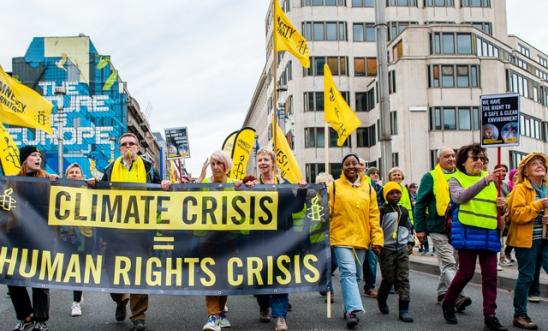
Press releases
Climate Change: Millions taking part in Earth Day is key to protecting the planet and people

Hundreds of millions of people expected to mark Earth Day this year
Severe environmental, health and human rights consequences due to the climate crisis
‘We are not moving fast enough to prevent a catastrophic rise in global temperatures’ - Marta Schaaf
Reacting to the vast numbers of people around the world expected to mark Earth Day on Saturday 22 April, Marta Schaaf, Amnesty International’s Director of Climate, Economic and Social Justice, and Corporate Accountability, said:
“We salute everyone who is helping to promote the protection of our planet and human rights.
“The impacts of climate change are not borne equally – many countries that contributed little to carbon emissions face near existential threats and overall there are severe health and other human rights consequences experienced mostly by racialised and marginalised people.
“The more attention and public support that is mobilised, the better the chances we have of limiting and reversing damage.
“The effects of the climate crisis are increasingly evident. A just energy transition away from fossil fuels has never been more urgent and we are not moving fast enough to prevent a catastrophic rise in global temperatures, yet public pressure on governments and corporations to act is having some effect.
“Everyone marking Earth Day should be encouraged to know that their collective action is having an impact and that this international show of solidarity should motivate many more to engage in the campaign to protect our human rights from the potentially devastating impact of climate change.
“We see how essential the right to protest is to claiming human rights and on this Earth Day, we thank climate activists.”
Extreme weather impact
A severe heatwave is currently gripping large parts of Asia, including Thailand, Laos, Bangladesh, parts of China and swathes of India, with temperatures far exceeding 40˚C. There is water rationing in Tunisia and a shortage in Spain, the forest fire season has already begun in France, and there are warnings that the harvest in Morocco and the wider Maghreb will be reduced by drought.
Progress in tackling the climate crisis is being made as seen from renewables’ output never having been higher, tangible advances in international and domestic legislation towards delivering climate justice and holding polluters accountable, as well as moves towards establishing a fossil fuel non-proliferation treaty and a loss and damage fund to help those who have suffered most from climate change shows public pressure is having an effect.